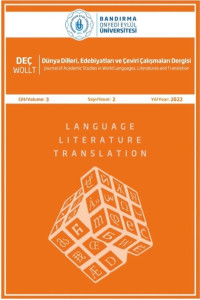Abstract
Thanks
Çeviri alanıyla ilk tanıştığımız andan itibaren her durumda yanımızda olan ve bu makalenin Türkçeye aktarımı süresi boyunca desteklerini esirgemeyen hocam Sayın Burcu Gökgöz Kurt'a en içten teşekkürlerimi sunarım.
References
- Anttiroiko, Ari, Lintilä, Leena and Savolainen, Reijo (2001): Information Society Competencies of Managers: Conceptual Considerations. In: Erik panzar, Reijo Savolainen and Païvi Tynjälä, eds. In Search for a Human-centred Information Society. Tampere: Tampere University Press, 27-57.
- Ballard, Michel (1999): Claude-Gaspar Bachet de Mériziac. Circuit. 65:20-21.
- Ballard, Michel (2007): De Cicéron à Benjamin, Traducteurs, Traductions, Réflexions. Presses Universitaires du Septentrion: Villeneuve d’Ascq.
- Boulanger, Pier-Pascale (2004): L’épistémologie cinétique de la traduction: catalyseur d’éthique. TTR. 17(2):57-66.
- European Union. Competences for professional translators, experts in multilingual and multimedia communication. Visited 9 May 2010, <http://ec.europa.eu/dgs/translation/programs/emt/key_documents/emt_competences_translators_en.pdf>.
- Froeliger, Nicolas (to be published): L’institutionnalisation au risque de la déstructuration: la question de la professionnalisation en traduction. In: Jose Carlos Hererras, ed. L’Europe des 27 et ses langues, minutes of the international conference L’Europe des 27 et ses langues. Paris: Université Paris Diderot, December 3-5, 2009.
- Gouadec, Daniel (2009): Guide des métiers de la traduction – localisation et de la communication multilingue et multimedia. Paris: La Maison du Dictionnaire. Kuhn, Thomas (1963/1983): The Structure of Scientific Revolutions. Chicago: University of Chicago Press.
- Levy, Jiri (1967/2000): Translation As A Decision Process. In: Laurence Venuti, ed. The Translation Studies Reader. London/New York, 148-159.
- Maylath, Bruce, Gnecchi, Marusca, Mousten, Birthe, et al. (2007): Professional Communication and Translation in Convergence. In: IEEE International Professional Communication Conference Proceedings, Montreal, 14 July 2008. New York: IEEE, 191-205.
- O’Hara, Frederick M., Jr. (2001): A Brief History of Technical Communication. STC’s 48th Annual Conference Proceedings, Society for Technical Communication, Arlington, Va., 500–504. Visited 9 May 2010, <http://www.stc.org/confproceed/2001/PDFs/STC48-000052. pdf>.
- Sing, Nitish and Pereira, Arun (2005): The Culturally Customized Web Site: Customizing Web Sites for The Global Marketplace. Oxford: Elsevier Butterworth – Heinemann.
- Thompson, Della (2005): The Concise Oxford Dictionary of Current English. Oxford: Clarendon Press.
- Virkus, Sirje (2003): Information Literacy: Seeking Meaning, Competency, Skills and Literacy. Lecture at Humbold University. Visited 9 May 2010, <http://www.forum-benutzung.de/ pub/bscw.cgi/d14724/Information%20Literacy%20/%20von%20Sirje%20Virkus>.
- Winterton, Jonathan, Delamare – Le Deist, Françoise, Stringfellow, Emma. Typology of knowledge, Skills and Competences: Clarification of the Concept and Prototype, Center for European Research on Employment and Human Resources, Groupe ESC Toulouse, Research Report Elaborated on behalf of Cedefop/Thessaloniki (26 January 2005). Visited 9 May 2010, <http://www.ecotec.com/europeaninventory/publications/method/CEDEFOP_ typology.pdf>.
Abstract
Keywords
Technical Communication translation competences survey convergence skills communication technique
References
- Anttiroiko, Ari, Lintilä, Leena and Savolainen, Reijo (2001): Information Society Competencies of Managers: Conceptual Considerations. In: Erik panzar, Reijo Savolainen and Païvi Tynjälä, eds. In Search for a Human-centred Information Society. Tampere: Tampere University Press, 27-57.
- Ballard, Michel (1999): Claude-Gaspar Bachet de Mériziac. Circuit. 65:20-21.
- Ballard, Michel (2007): De Cicéron à Benjamin, Traducteurs, Traductions, Réflexions. Presses Universitaires du Septentrion: Villeneuve d’Ascq.
- Boulanger, Pier-Pascale (2004): L’épistémologie cinétique de la traduction: catalyseur d’éthique. TTR. 17(2):57-66.
- European Union. Competences for professional translators, experts in multilingual and multimedia communication. Visited 9 May 2010, <http://ec.europa.eu/dgs/translation/programs/emt/key_documents/emt_competences_translators_en.pdf>.
- Froeliger, Nicolas (to be published): L’institutionnalisation au risque de la déstructuration: la question de la professionnalisation en traduction. In: Jose Carlos Hererras, ed. L’Europe des 27 et ses langues, minutes of the international conference L’Europe des 27 et ses langues. Paris: Université Paris Diderot, December 3-5, 2009.
- Gouadec, Daniel (2009): Guide des métiers de la traduction – localisation et de la communication multilingue et multimedia. Paris: La Maison du Dictionnaire. Kuhn, Thomas (1963/1983): The Structure of Scientific Revolutions. Chicago: University of Chicago Press.
- Levy, Jiri (1967/2000): Translation As A Decision Process. In: Laurence Venuti, ed. The Translation Studies Reader. London/New York, 148-159.
- Maylath, Bruce, Gnecchi, Marusca, Mousten, Birthe, et al. (2007): Professional Communication and Translation in Convergence. In: IEEE International Professional Communication Conference Proceedings, Montreal, 14 July 2008. New York: IEEE, 191-205.
- O’Hara, Frederick M., Jr. (2001): A Brief History of Technical Communication. STC’s 48th Annual Conference Proceedings, Society for Technical Communication, Arlington, Va., 500–504. Visited 9 May 2010, <http://www.stc.org/confproceed/2001/PDFs/STC48-000052. pdf>.
- Sing, Nitish and Pereira, Arun (2005): The Culturally Customized Web Site: Customizing Web Sites for The Global Marketplace. Oxford: Elsevier Butterworth – Heinemann.
- Thompson, Della (2005): The Concise Oxford Dictionary of Current English. Oxford: Clarendon Press.
- Virkus, Sirje (2003): Information Literacy: Seeking Meaning, Competency, Skills and Literacy. Lecture at Humbold University. Visited 9 May 2010, <http://www.forum-benutzung.de/ pub/bscw.cgi/d14724/Information%20Literacy%20/%20von%20Sirje%20Virkus>.
- Winterton, Jonathan, Delamare – Le Deist, Françoise, Stringfellow, Emma. Typology of knowledge, Skills and Competences: Clarification of the Concept and Prototype, Center for European Research on Employment and Human Resources, Groupe ESC Toulouse, Research Report Elaborated on behalf of Cedefop/Thessaloniki (26 January 2005). Visited 9 May 2010, <http://www.ecotec.com/europeaninventory/publications/method/CEDEFOP_ typology.pdf>.
Details
| Primary Language | Turkish |
|---|---|
| Subjects | Linguistics |
| Journal Section | Translation |
| Authors | |
| Translators | |
| Publication Date | December 30, 2022 |
| Submission Date | June 5, 2022 |
| Published in Issue | Year 2022 Volume: 3 Issue: 2 |


